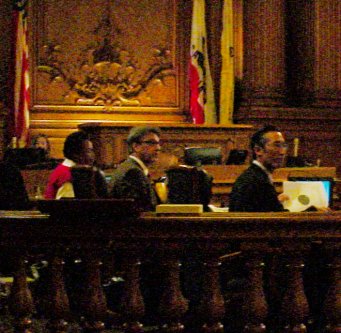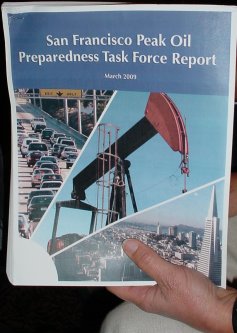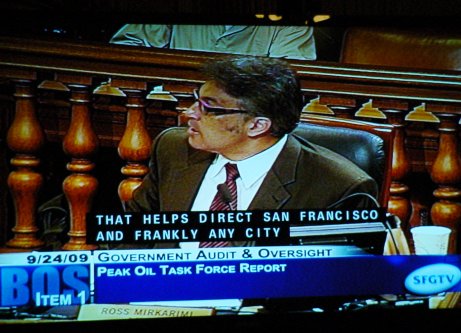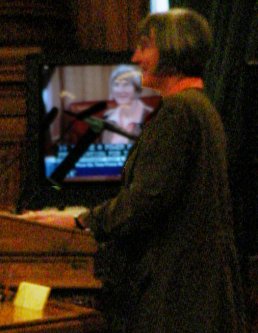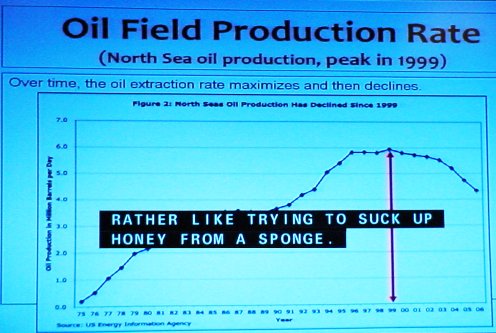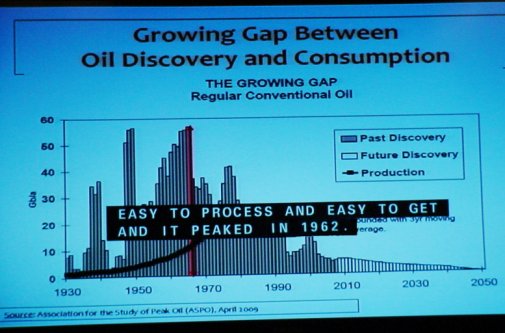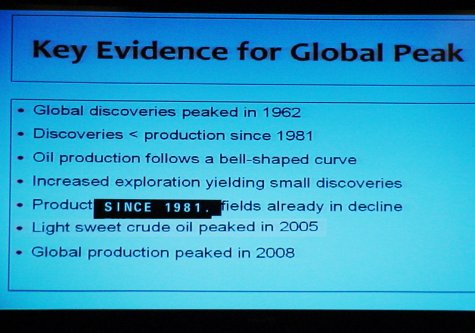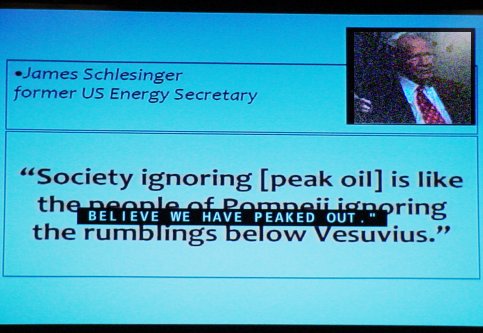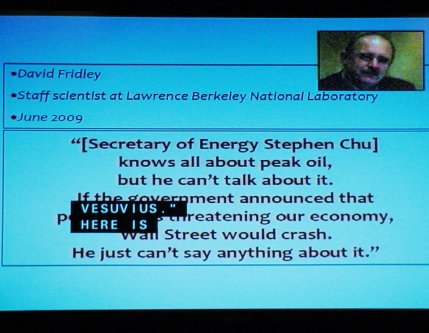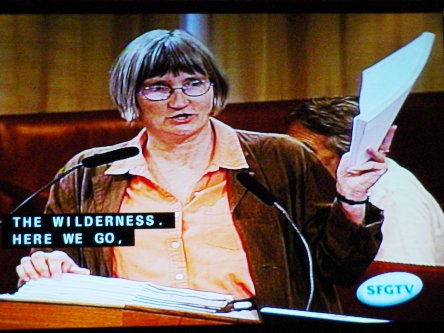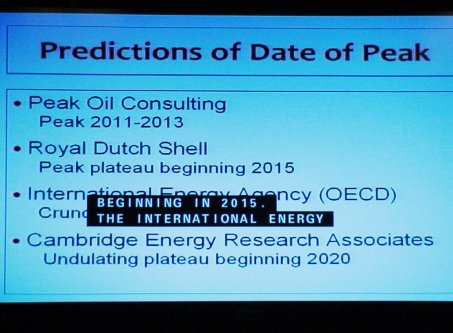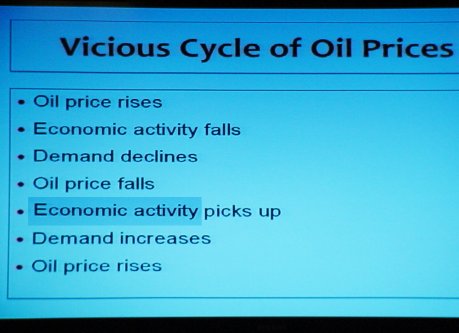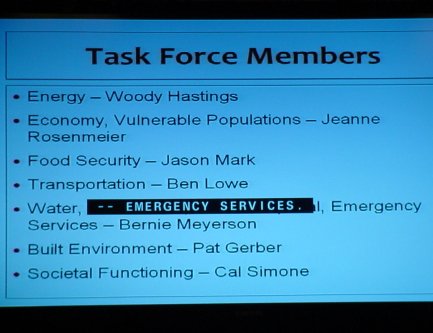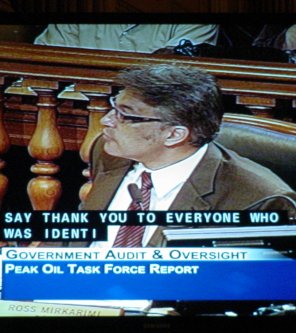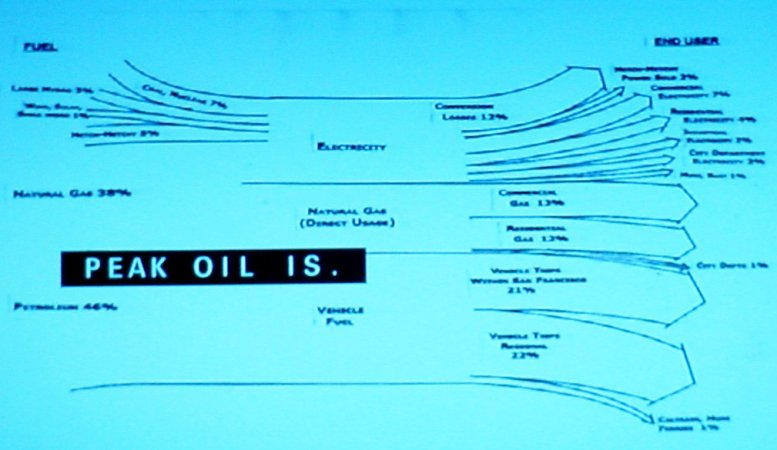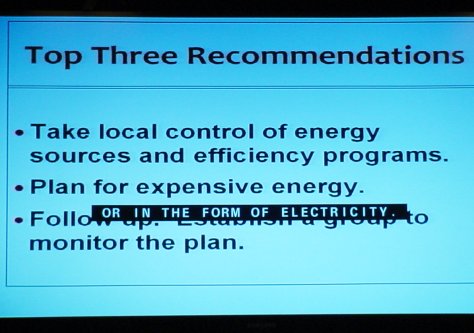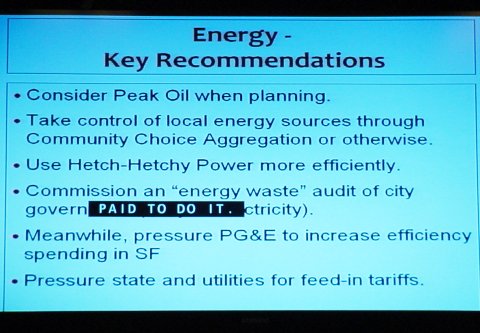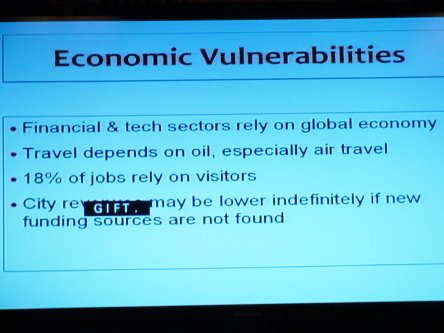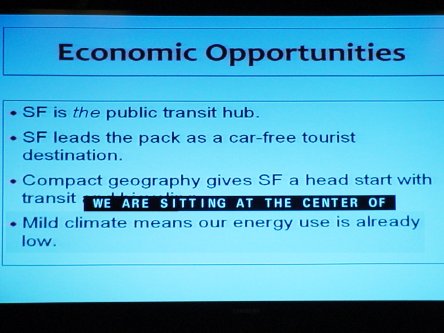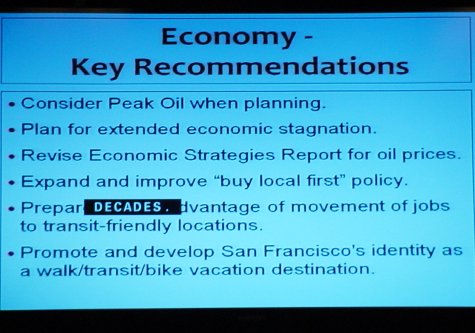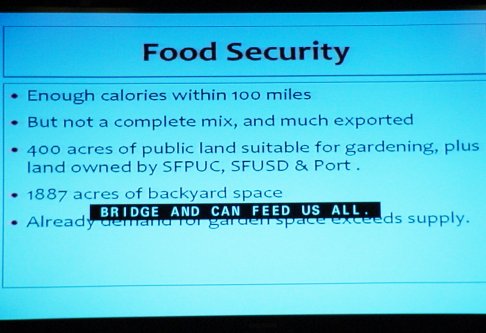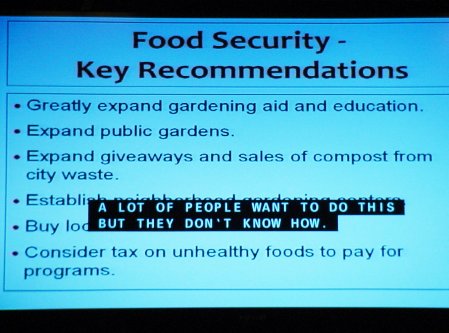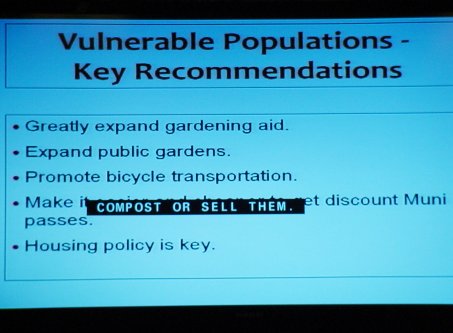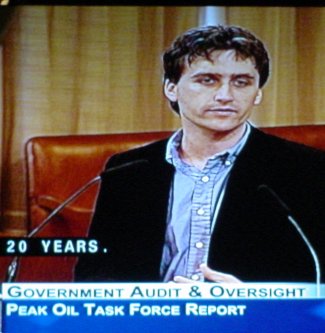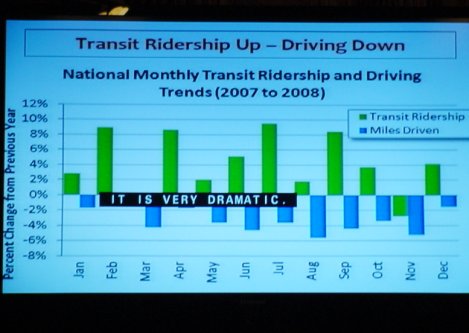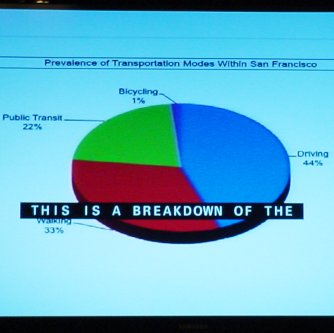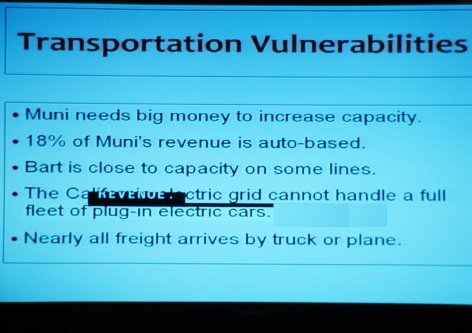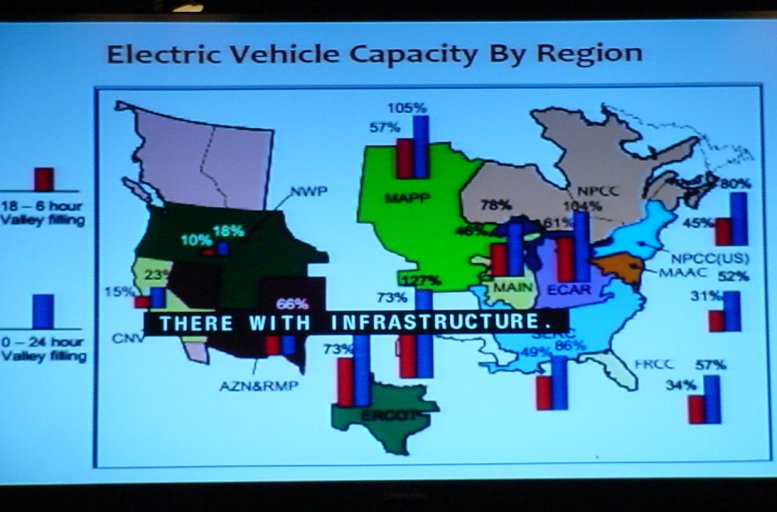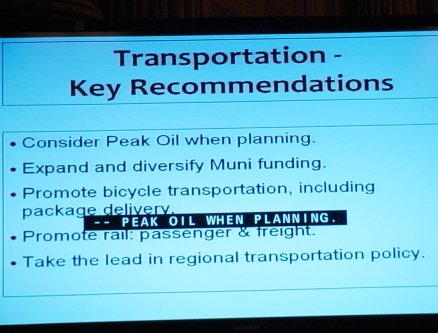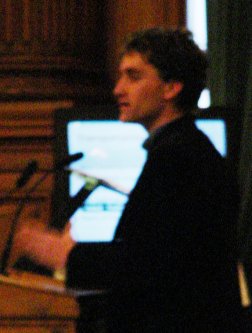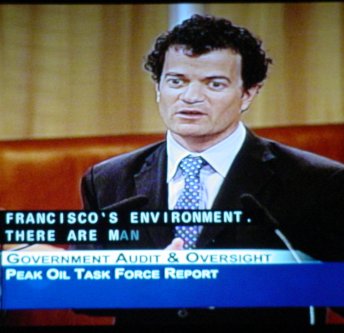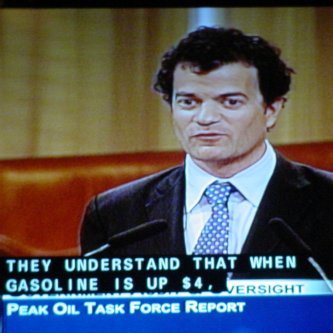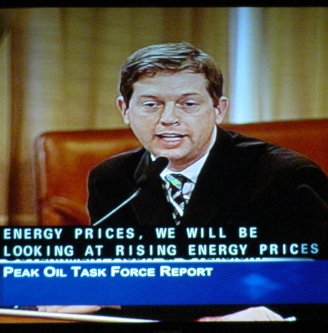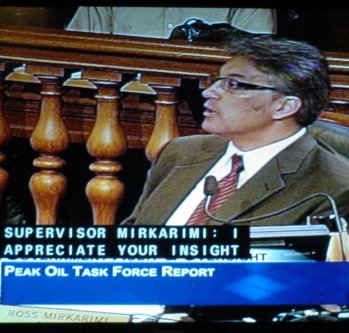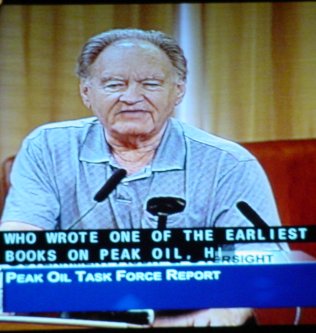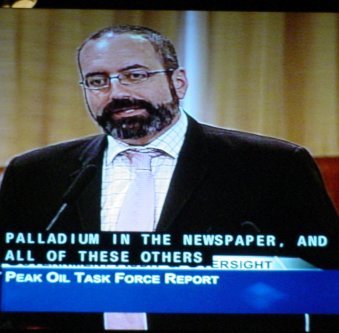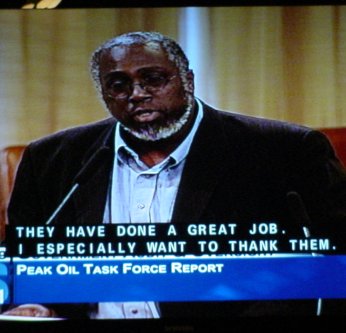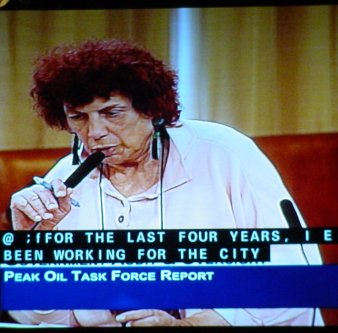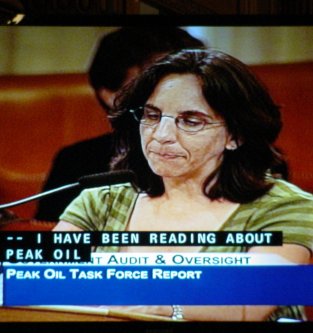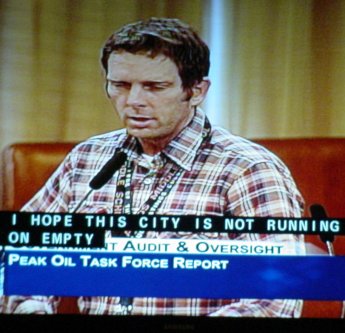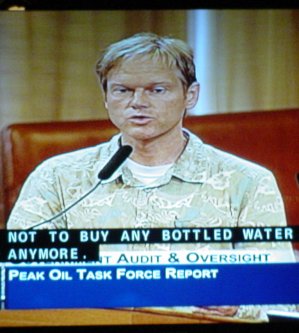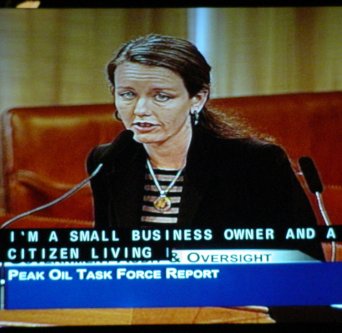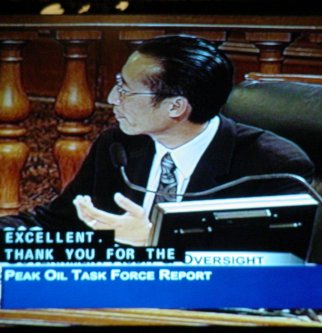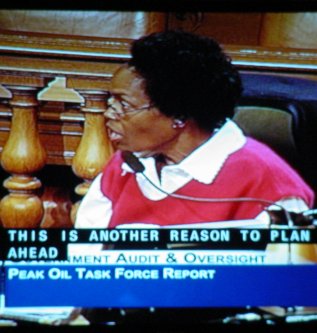After two years of work, the San
Francisco Peak Oil Preparedness Task Force was ready to submit their
report to the Board of Supervisors with a meeting in City Hall that was
televised live on cable's government channel. I got there just as it
was beginning.
Ross Mirkarimi started the meeting by
pointing out that the front page of that morning's New York Times had
an article about a big new find of oil. He said that reading between
the lines, you could see that it was further off shore than previous
finds, and in deeper water. It was going to be harder to bring that oil
to market. The fact that we are willing to do that underscores the need
for the Task Forces work. Then he invited Jean Rosenmeier to the podium
to tell us about what they had found.
Jean explained that pumping oil is more
like extracting honey from a sponge than it is like draining a barrel.
Because of this, every field seems to go through a bell shaped recovery
curve, where little oil is extracted in the beginning, followed by peak
production years. After that yield becomes more of a function of price,
with production halted when it doesn't make economic sense. Global oil
production is a sum of the individual yield curves of the oil fields
out there.
Different oil fields reach peak
production at different times, depending on when they were discovered,
what technology was used then, and many other factors. However, it does
seem that oil production has already peaked. It is too early to know if
that is THE peak or just A peak, but clearly oil production has fallen
since then.
Oil
field discovery peaked in 1962, and since the bell curve of oil
production from every field starts when the first production well is
drilled, it makes sense that the peak of production would follow the
peak of discovery.
After going through the above she read
a few quotes from notable personages to illustrate the reality of the
problem. I only put a couple of them here.
Different experts have different dates
for when peak oil will occur. The range seems to be somewhere in the
range of next year to next decade sometime. Only Clinton was bold
enough to suggest the peak might have already happened.
Whenever peak oil happens, demand has
caught up with supply already. For most of the last century, more
demand for oil was just an excuse to hire more oil workers, drill more
wells, and pump more oil. That first changed in the 1970s. There was
something of a new higher plateau for oil price in the 1980s, but since
then the price has hit the highest levels in all of industrial history.
Future prices are less predictable than they used to be, but it is
likely they will be above historic levels.
There is a direct effect of the price
of oil on our economy. (Behind the words is a picture of a guy pushing
his car because high gas prices sent the economy south and he has no
other way to move it.)
Jean wanted to show these points around
a circle, to illustrate the cyclical nature of oil price swings, but
her tools wouldn't let her. In general, rising oil prices choke the
economy, and falling prices lubricate it. Lower prices increase demand,
which causes prices to rise, which chokes demand, which causes prices
to fall. Then the pattern repeats again and again.
She finished her presentation by
thanking the members of the Task Force by name. A few were in the room
and she had those members rise briefly while their names were spoken.
After she finished the list, Ross added his thanks.
Then Jean put on the energy hat for
that chair, who couldn't be with us. She pointed out that more than
three quarters of the energy San Francisco uses is supplied by oil and
natural gas. Since they are both finite fossil fuels, the city is
vulnerable to price swings, the usual method of balancing out supply
and demand. To give us an idea of the scale of the change, she pointed
out that all of the work we have done in the past decade to bring more
solar on line has only moved solar power from one percent of the city's
supply to two percent of the city's supply. Probably the biggest bang
for the buck is in demand reduction.
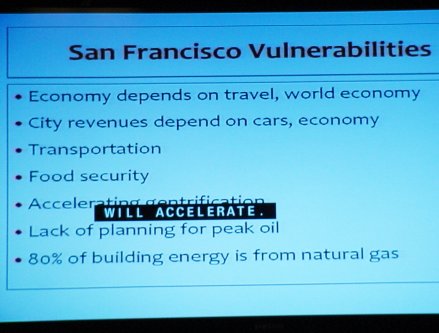
Another vulnerability come from the
fact that San Francisco has a large tourist industry, which is
dependent on cheap travel. Similarly the high tech industry and finance
industries, both of which have a strong presence in the city, are
impacted by the price of energy. Then there is the fact that a lot of
the food eaten in San Francisco has to be shipped in, which also uses
lots of energy. The task force expects that as oil prices rise, people
with economic leverage will want to abandon suburbia, and that will
further gentrify the city.
The key recommendation is to plan for
expensive energy supplies.
She pointed out that a lot of city
government doesn't have power meters that give the people working there
an incentive to use less power. She suggested adding meters to identify
waste and stop it. Another recommendation was to make it worth
something
to pump power into the grid. Right now all somebody can do is reduce
their bill to zero. We need incentives to produce more power!
Jean finished by passing the mike to
Ben Lowe, who talked about transportation.
Ben began by pointing out that recently
there has been a steady decline in vehicle miles traveled, and an even
more dramatic rise in transit ridership across the USA. Expanding MUNI
is the best way to respond to that trend.
He wanted us to notice that San
Francisco has less excess generating capacity to charge electric cars
with than places like Texas have. Adding enough capacity to change that
would be very expensive.
These were followed by some brief
comments from government officials.
The guy on the left is San Francisco's
in house economist. He also reminded us that San Francisco was one of
the winners of the cheap energy era.
This guy has studied emergency response
systems in great detail. He said something like "all of the disaster
plans I know about boil down to stop the bleeding and ride it out until
help comes." Then he explained that "what makes peak oil different is
that there isn't going to be help coming from outside. We need to find
the resources to deal with it locally."
The guy in the suit has something to do
with BART. He pointed out that many developers had lost a lot of money
when people had stopped wanting to live further out from their jobs
then they had before. He also said good things about a walkable
lifestyle, and that we should stop building freeways.
This was followed by members of the
public that had something to say.
I wish I could remember what they said.
As you can see, there was still a line
of people waiting for an opportunity to speak on the subject for two
minutes each.
The guy in the checkered shirt strung
together lines from old songs, but twisted them to be vaguely on topic.
It was about the only comic relief we had in the whole hearing.
Then Supervisor Mar and Supervisor
Maxwell made some closing remarks.
They finished by pointing out where you
can go to download the thing online. If you click on the website
address above, and then click on the "Peak Oil Task Force Final Report"
you can then download the 2.4 megabyte file to read at your leisure.
Probably you will have to scroll down a bit to see that button under
the "Resources:" header.
After the meeting was over Ross talked
a bit with the task force. He started by saying "you could probably
stack the reports that have been submitted here to the ceiling of this
chamber." He wanted them to force the city to do the right thing. I
hope something comes of it. We shall see...
